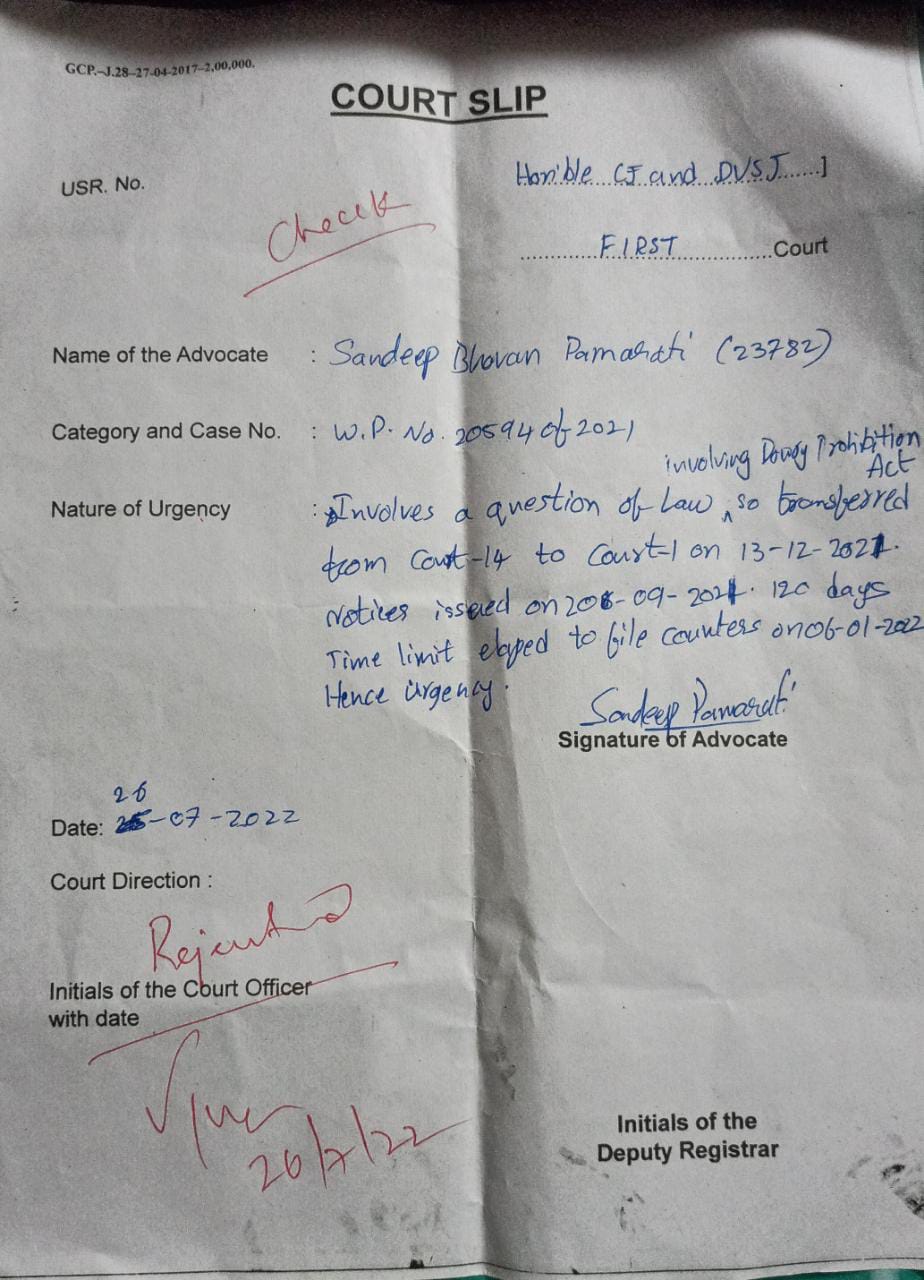After losing out (didn’t lose the case but didn’t get opportunity to argue in-person) in an earlier attempt here, I decided to take Writ Petition route as I am (along with my parents!) one of the affected person of this biased implementation of a convoluted interpretation of section 7(3) of Dowry Prohibition Act 1961 (amended in 1986). Also, decided to decentralize my PIL prayers.
So picked up this prayer from earlier attempt and worked on writing the WP.
Issue a Writ, Order or Direction, more particularly one in the nature of Writ of Mandamus to Respondents, such that there is no ambiguity to them whether to prosecute the Dowry givers under section 3 of DP Act read with section 7 of DP Act and no discrimination is made between Dowry Giver and Dowry Taker, under Section 3(1) of DP Act, in similar fashion as that of made by Bangladesh.
Key Point
Shouldn’t all Dowry givers be booked and prosecuted as per section 3 of Dowry Prohibition Act 1961 (as amended from time to time) or not?
Arguments – Counter Arguments
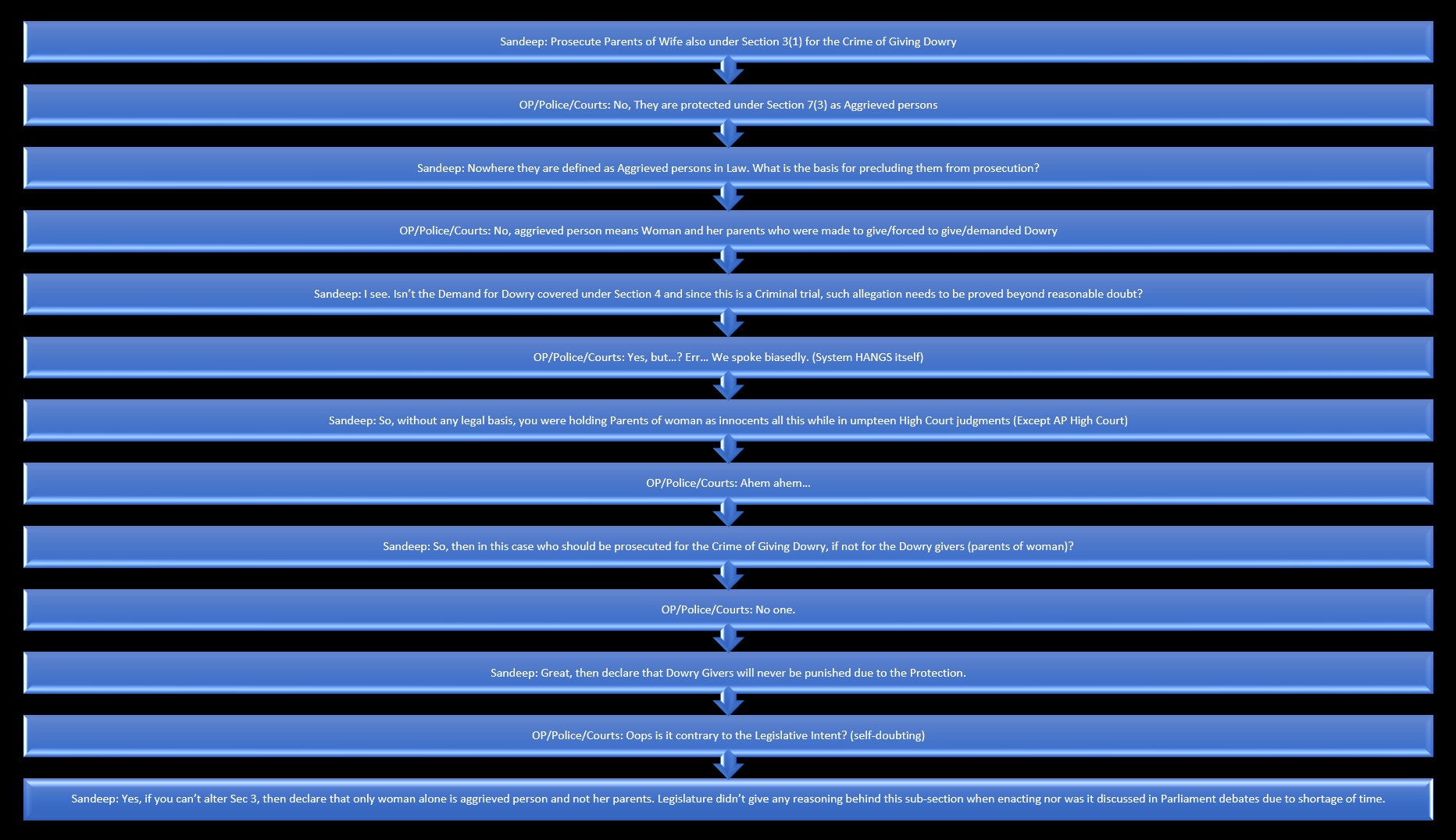
Another simple point from the Bare Act itself.
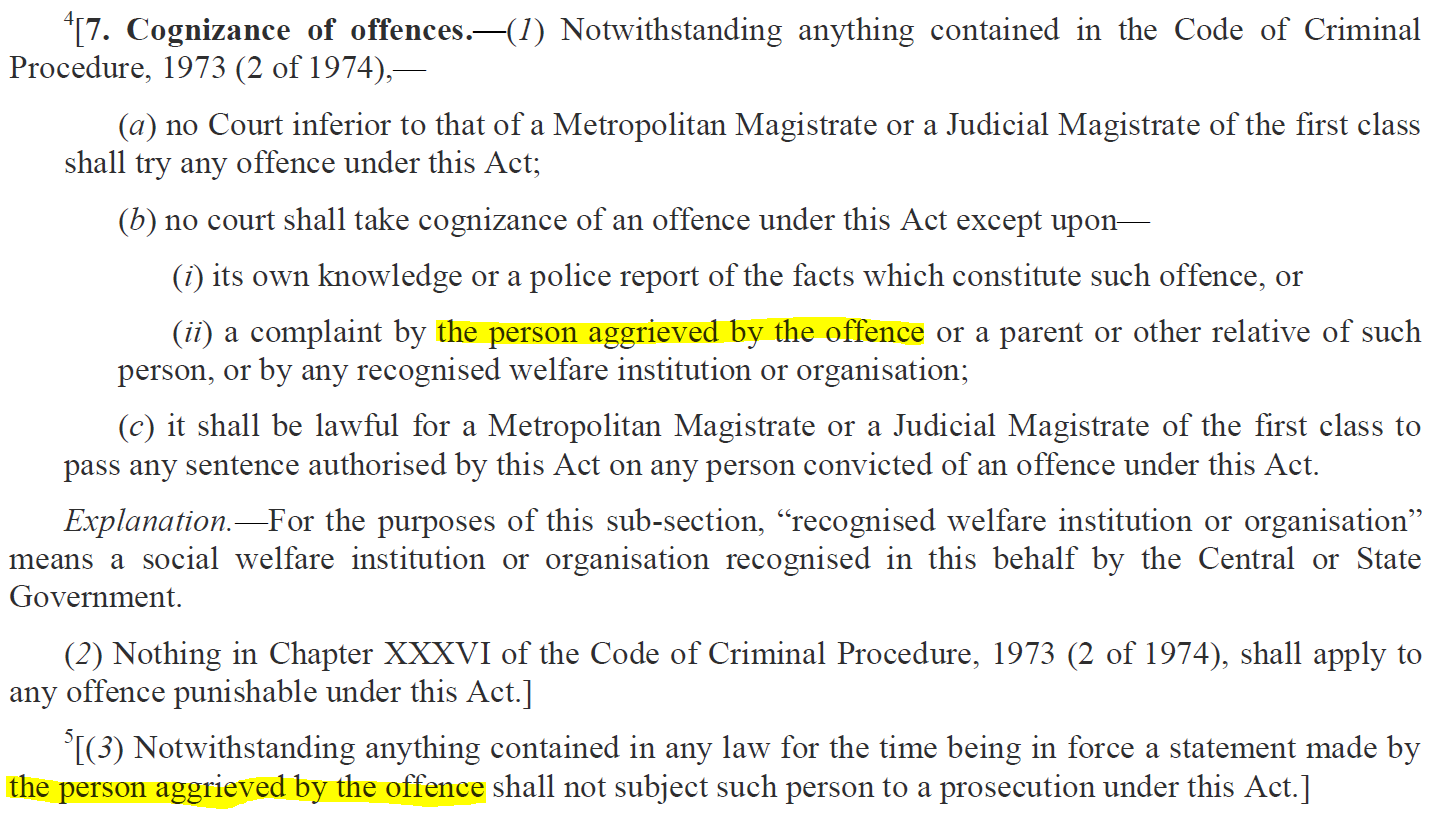
Prayer
Prosecute Dowry Givers u/s 3(1) without protecting them u/s 7(3) = Article 14 and 21 compliance
Alternatively, strike down words ‘Gives’ and ‘abets to give’ from section 3(1) = ultra-vires to Article 14 and 21 compliance and contrary to legislative intent
Either-way, I win!
Full prayers from the Writ Petitions:
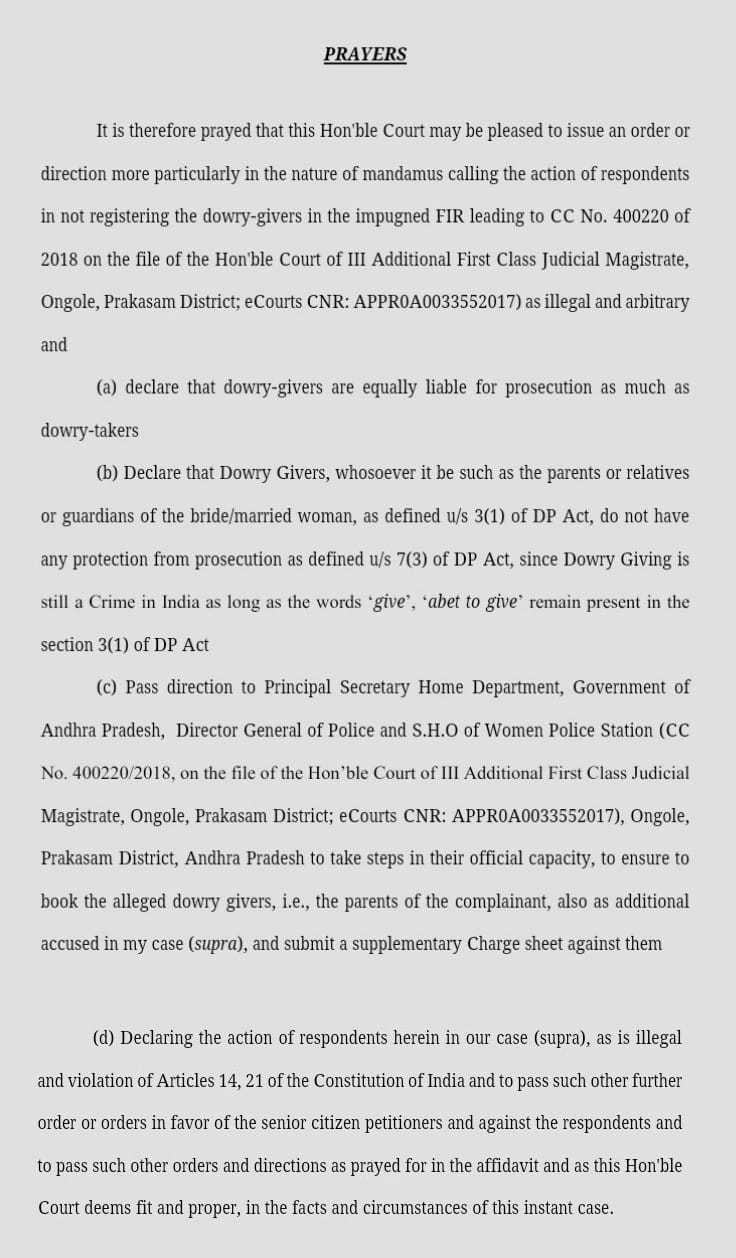
All the cited case laws are listed here.
ACTION STARTS:
WP (in the name of my parents, and not in my name) is filed on 14-09-2021. WP No. 20594 of 2021 (WPSR 27260/2021). Here is the affidavit.
Writ Petition seeking direction against misinterpretation of Sec 7(3) of DP Act 1961 3.5 ONLY AFFIDAVIT
Case Details

Filed a memo with additional information on 17-09-2021:
MEMO for Extra Info
Order Passed on 20-09-2021
Initial hearing before admission on 20-09-2021. Notices issued to the Respondents. Government Advocates take notice and sought 4 weeks time to file Counters.
Veerabhadra Rao Pamarati and Anr Vs UOI and Ors on 20 Sep 2021
Next Date of Hearing : 13-12-2021
- The case was transferred from Court-14 to Court-1, since there is a question of law involved.
- It is almost 90 days from the date of issue of notices to Government advocates but I am still waiting for the Counters to be filed by them. I suspect, they will continue to seek additional time. Let’s see how this gamble goes on…
Since the petitioner is questioning the vires of the Dowry Prohibition Act, Registry is directed to post the matter before the appropriate Bench as per roster.
2 Veerabhadra Rao Pamarati and Anr Vs UOI and Ors on 13 Dec 2021
Next Date of Hearing : 16-12-2021
- My Advocate took two weeks time.
On the request made by Ms. Sridevi Jampani, learned counsel for the petitioners, post this case after two weeks.
3 Veerabhadra Rao Pamarati and Anr Vs UOI and Ors on 16 Dec 2021
Next Date of Hearing : 30-12-2021
Due to COVID-19 situation, the Court-1 took up only part of the Causelist and rest of the cases, including mine, was not listed. No future date known.
Next Date of Hearing : 13-06-2022
Since 4 months, not a single listing was possible. Frankly, not asked/mentioned/represented appropriately by the advocate. Will wait out the Vacation period for High Court and then get the advocate changed to… myself. Hence filed the NOC obtained from previous advocate and my vakalat. (Expense: Rs.300/-)
Next Date of Hearing : 14-06-2022
I am the new Advocate for this Writ Petition.
Updated on eCourts Website…
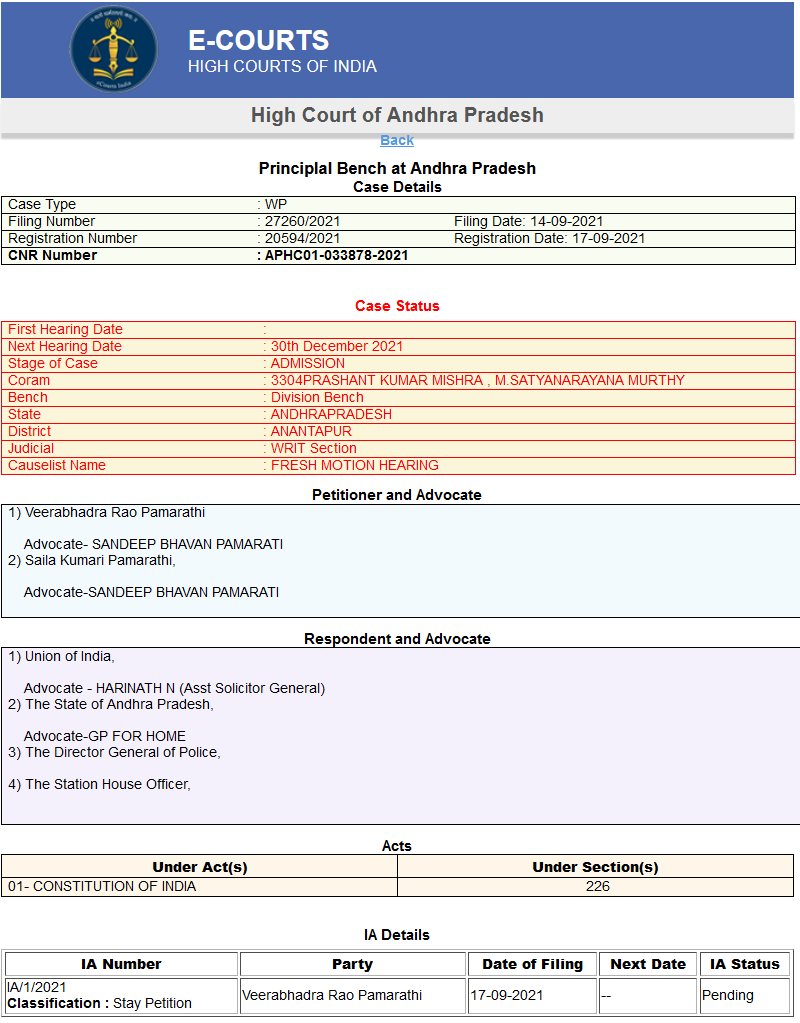 ‘
‘
Updated on eCourts app…
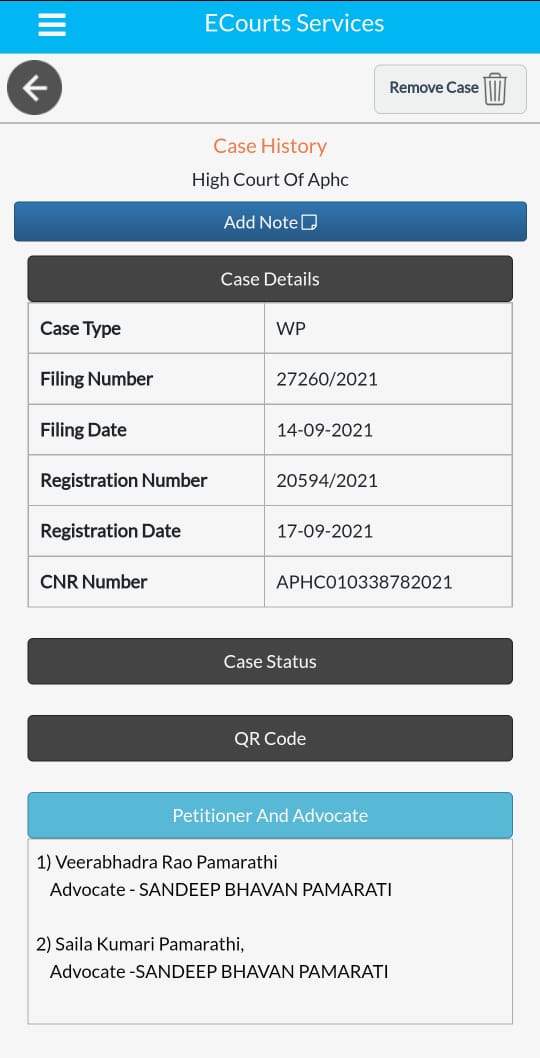
Updated on AP High Court Case Status website…
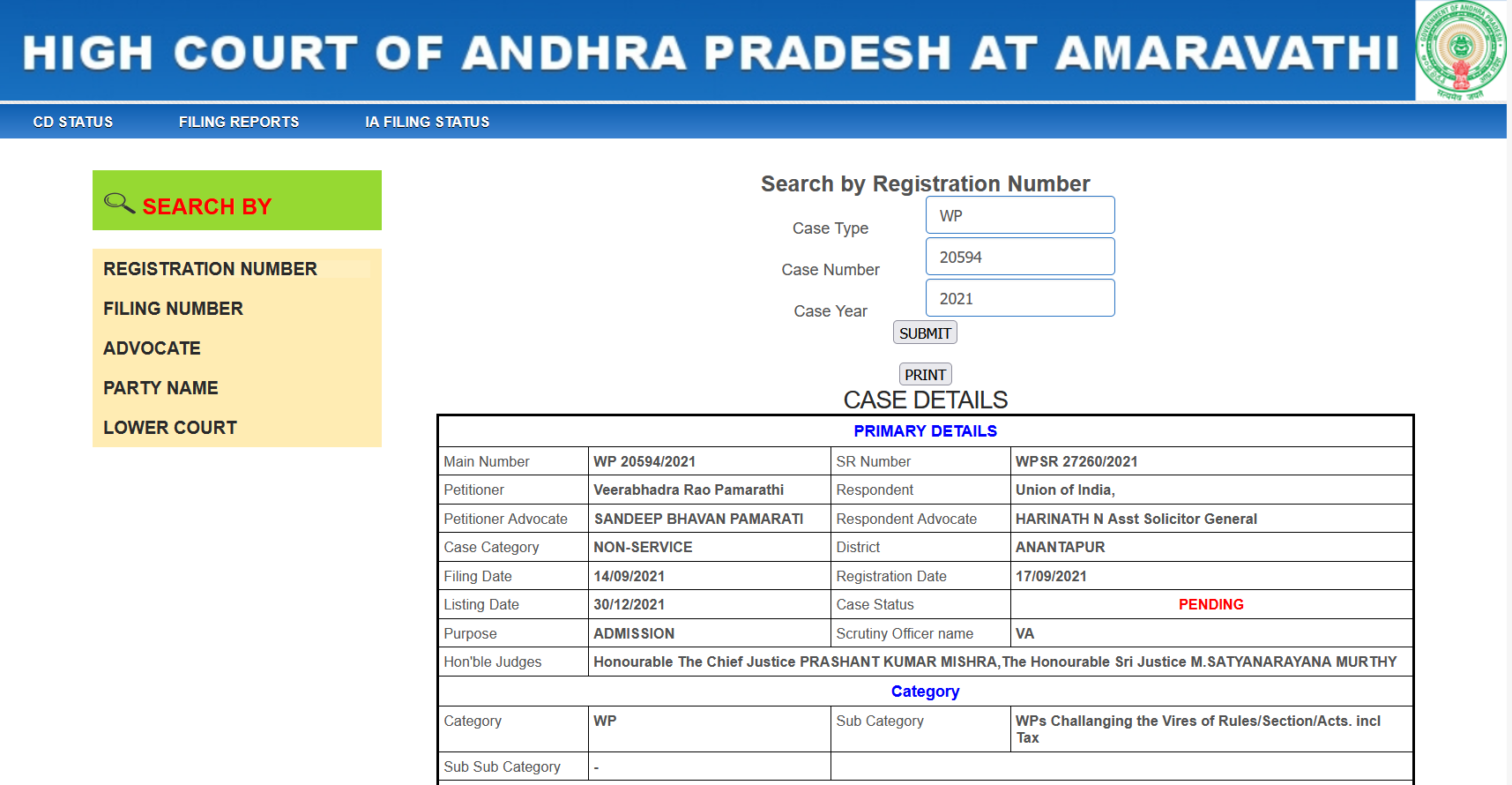
Next Date of Hearing : 23-06-2022
I went and appeared before Court 1 today. Got a Court slip filled and ready. Gathered up courage (my first time facing a High Court judge, that too Chief Justice!) and stepped up to the mike. Cleared my throat and uttered few words.
—————————————
Me: The matter pertains to a Writ Petition filed in Sep 2021.
CJ: What is the urgency?
Me: The matter was not listed after Dec 2021.
CJ: We have around 2.5 lakh cases pending, some for much more time than that. (Don’t know if he is proud/sad about this). Again what is the urgency?
Me: The matter pertains to critical question of law regarding Dowry Prohibition Act
CJ: No urgency. Mention rejected.
—————————————
What do I do next?
Next Date of Hearing : 26-07-2022
Going to take a different plea for urgency.
– Court-14 issues Notices to the Respondents on 08-09-2021.
– Government Advocates take the notice and seek 4 weeks time to file Counters on same day.
– Court-14 transfers the Writ Petition to Court-1 since there is a question on the vires of the Dowry Prohibition Act 1961 on 13-12-2021.
– Lapse of 120 days on 06-01-2022
(as per amended Rules 12(i)(a) and 12(ii) of AP HC Writ Proceeding Rules 1977)
-[12(i)(a) Every Respondent in every Writ Petition intending to enter appearance and oppose any Writ Petition on which notice is issued by the High Court, shall enter appearance and file a Counter Affidavit in opposition as soon as may be and in any event not later than one hundred and twenty days from the date of service of notice in the Writ Petition or the Service of Rule nisi on the said Respondent”.]
-[12(ii) “No counter affidavit filed beyond one hundred and twenty days from the date of service of notice on the opposite party or parties in the Writ Petition shall be received or be used at the hearing of the Writ Petition unless the Court grants leave to file counter affidavit beyond the stipulated period, subject to such terms as the Court may deem fit.”]
– Till date none of the Respondents filed any Counter so I can submit to Court-1 to strike out the defence of the Respondents and pass orders in the Writ, as the Hon’ble Court finds appropriate.
- Union of India
- State of Andhra Pradesh
- Director General of Police
- Station House Officer, Disha Women Police Station, Ongole
On Next Date of Hearing : 26-07-2022
I went and appeared before Court 1 today. Got a Court slip filled and ready.
—————————————
Me: The matter pertains to a Writ Petition filed in Sep 2021 and Notices were issued also.
CJ: What is the urgency?
Me: The respondents have not filed any Counter Affidavits till date. As per Writ Rules, only 120 days time is given to respondents to file their Counter Affidavits but in this case already 320 days elapsed.
CJ: If we go by Rules, I will have to dismiss many petitions. May be in future, you will be respondent. What to do then? (Don’t know how Petition can be dismissed for fault of Respondent?). Again what is the urgency?
Me: (silent)
After lunch time, I get to know that my Court Slip/Mentioning was rejected by CJ. Again.
—————————————
Here is the rejected Court slip.
What do I do next? God knows!
Next Date of Hearing : 05-08-2022
Since I was not in a habit of checking the listing of my cases (officially just two; for one, CJ doesn’t see urgency, for another, File not available at AP HC), I totally missed to appear before the Court in which this case got listed miraculously. Also since it was my 40th birthday, I had reached my home town in the morning of 5th August.
See the time at which I received the SMSs (I got them after the business of the Court ended)
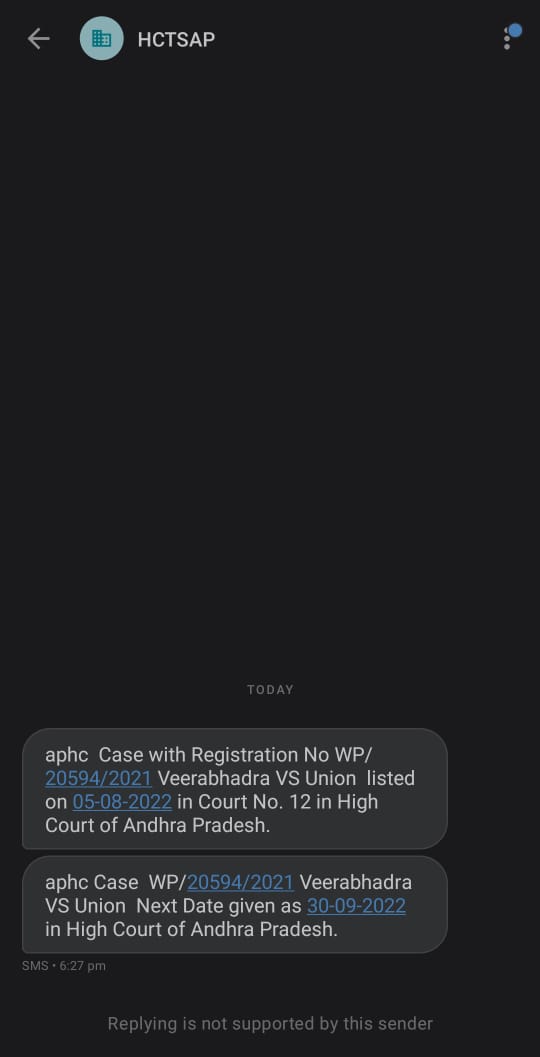
[Note: Filed RTI application to AP HC, asking for the number of Writs for which Counter was NOT filed within 120 days. Interesting reply awaited!]
2022-08-05 Listing of 20594 of 2021
Here is the order passed. Not sure if Counter is filed by the Respondent No.1 (Union of India)
4 Veerabhadra Rao Pamarati and Anr Vs UOI and Ors on 05 Aug 2022
Next Date of Hearing : 30-09-2022
The matter came before Justice AV Sesha Sai and Justice D Venkata Ramana. Just before lunch, the case was called up and I and Sridevi madam pushed for admission of case and disposal of IA.No. 1 which is stay petition. The case was directed to be listed after vacation.
Next Date of Hearing : 10-05-2023
The previous couple weeks went in roaming around couple of high-headed posting clerks in Criminal Posting Section. I had to move a Court slip the previous day for the case to be listed today. Thanks to those who helped me.
The Division bench comprised Justice U Durga Prasad Rao and Justice T. Mallikarjuna Rao. When my name was called out, I was trembling. For fear of sabotaging everything that I worked on for over 5 years. The short interaction went fine, as follows.
UDPR J(smiling): So husband is seeking prosecution of In-law?
Sandeep: No your honor, his parents are seeking prosecution of the parents of their daughter-in-law
UDPR J: Those giving dowry are to be prosecuted by law under Dowry Prohibition Act 1961?
Sandeep: Yes your honor
UDPR J: Is there any case law on this aspect?
Sandeep: Yes your honor, the case laws are annexed
Other side was directed to come prepared on next date (Section 3, 4 of DP Act) and next date was granted for 15-06-2023. Finally for Counters and for hearing (and disposal, hopefully!). No stay was granted on Trial Court proceedings.
5 Veerabhadra Rao Pamarati and Anr Vs UOI and Ors on 10 May 2022
As usual the SMS Alert came at 4.15 PM
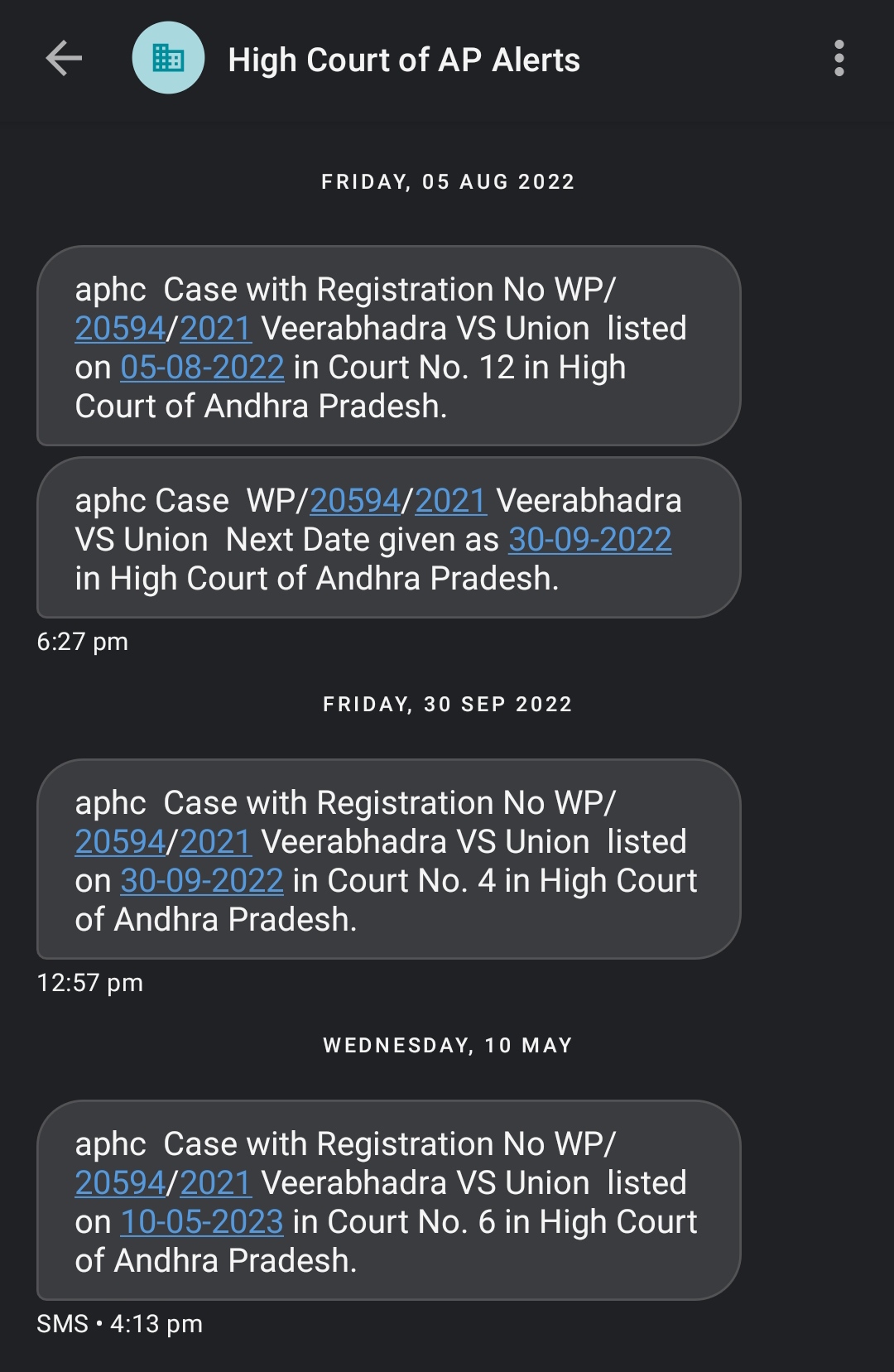
Next Date of Hearing : 5-07-2023
The Petition was not listed. Reason: The Judges were busy with interviewing the prospective Junior Civil Judges!!!
Next Date of Hearing : 25-07-2023
After waiting for the petition to be listed for over 2 weeks, I mentioned the matter before the Division Bench. It was directed to be listed on 27 July 2023. Yipieeeee!
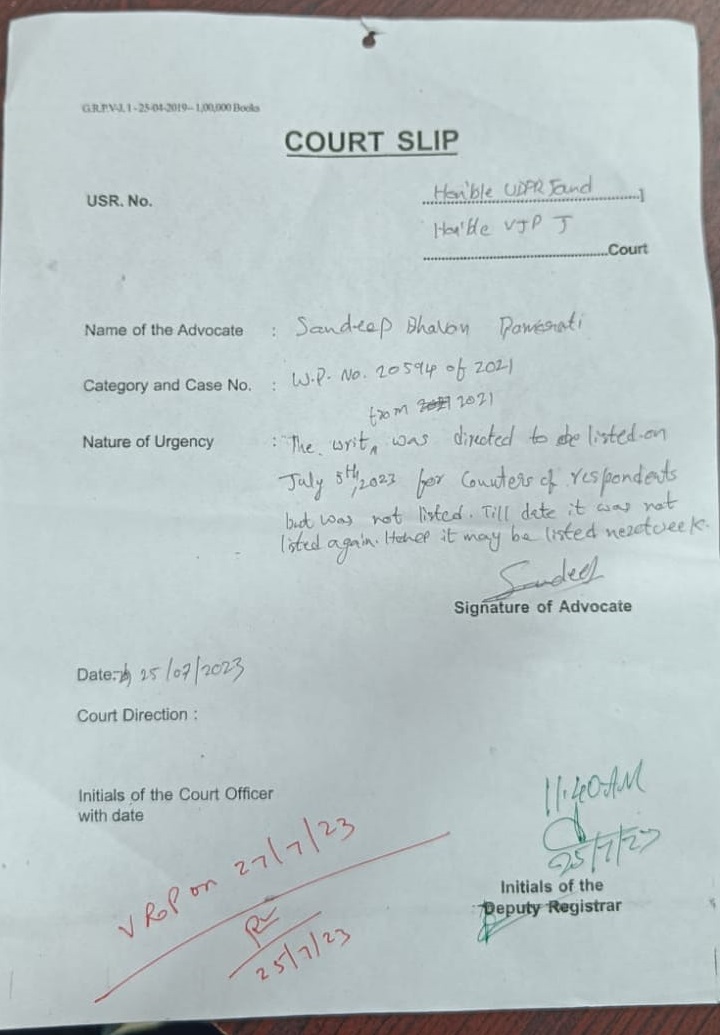
Next Date of Hearing : 27-07-2023
Again 2 more weeks of time given, on Respondent’s request and the judge denied stay on trial Court proceedings. But Judge said since there is possibility of wide implications, he wants the Respondents to file Counters. Finally. I agreed.
No Order was passed though.
Next Date of Hearing : 11-08-2023
It was directed that the WP be listed on 23-08-2023 (Landing of Vikram on the Lunar south!). Again 2 weeks time given, inspite of saying finally for Counters, thrice. Bench orally indicated that they want to learn the views of Advocate General.
Next Date of Hearing : 23-08-2023
Came rushing to Mangalagiri but the WP was NOT listed. So I decided to mention it on 24-08-2023.
Next Date of Hearing : 24-08-2023
Interesting date… I mentioned the matter (out of list!) and the Bench said we will hear the views of AG today. So I had to wait until item 14 when learned Advocate General (AG) would present his arguments in a matter, after which the bench sought the views of AG. At that moment, a battery of 20+ advocates gathered around the bench. Each of them expressed varied views and they laughed it out. I had to keep my cool. The matter is listed (compulsory) for 08 Sep 2023.
2023-08-24 Court slip - Compulsory Listing on 08 Sep 2023
List of mentions…

Next Date of Hearing : 08-09-2023
Due to change in roster, this case got transferred to Court-1. I mentioned the case before Court-1 and it was directed to be listed shortly.
Final Outcome : 26-09-2023
The case is dismissed. Awaiting Order copy. Judges raised these points…
I – There can be only two possibilities: Dowry giving is a crime or not
J – No, Why only two?
J – Have you followed Sakiri Vasu Vs State of UP
I – Yes, sent representations to SHO, DGP, Home Secretary
J – Nope, that is not sufficient compliance
I – My prayer is to interpret the provisions of DP Act and declare that Dowry giving is a crime
J – We do not do that kind of declaring a provision.
I – You can do that on a petition, such as this.
J – Nope
I – Three is no protection to dowry givers even u/s 7(3) of DP Act
J – They are aggrieved persons
Final Judgment
I am looking at the following next steps and discussing them with relevant people (first finding them)…
1. SLP at SCI
2. New PIL at any other HC, with limited prayer, to avoid reasons given by APHC
3. File a PIL directly at SC under Article 32
4. Mystery remedy…

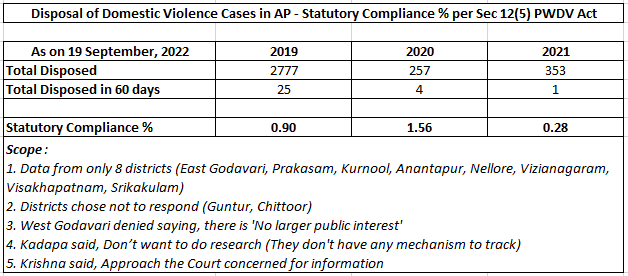
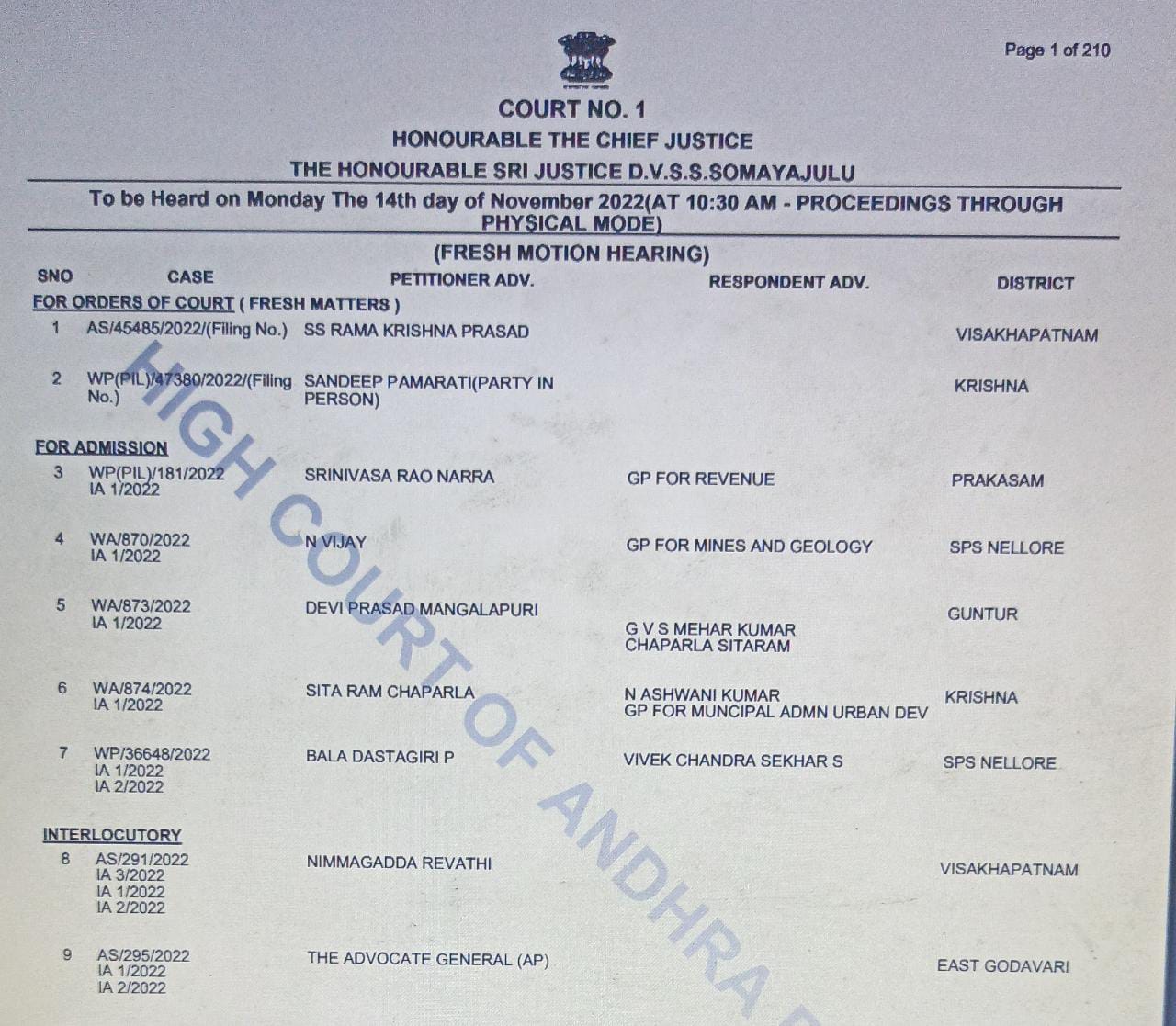

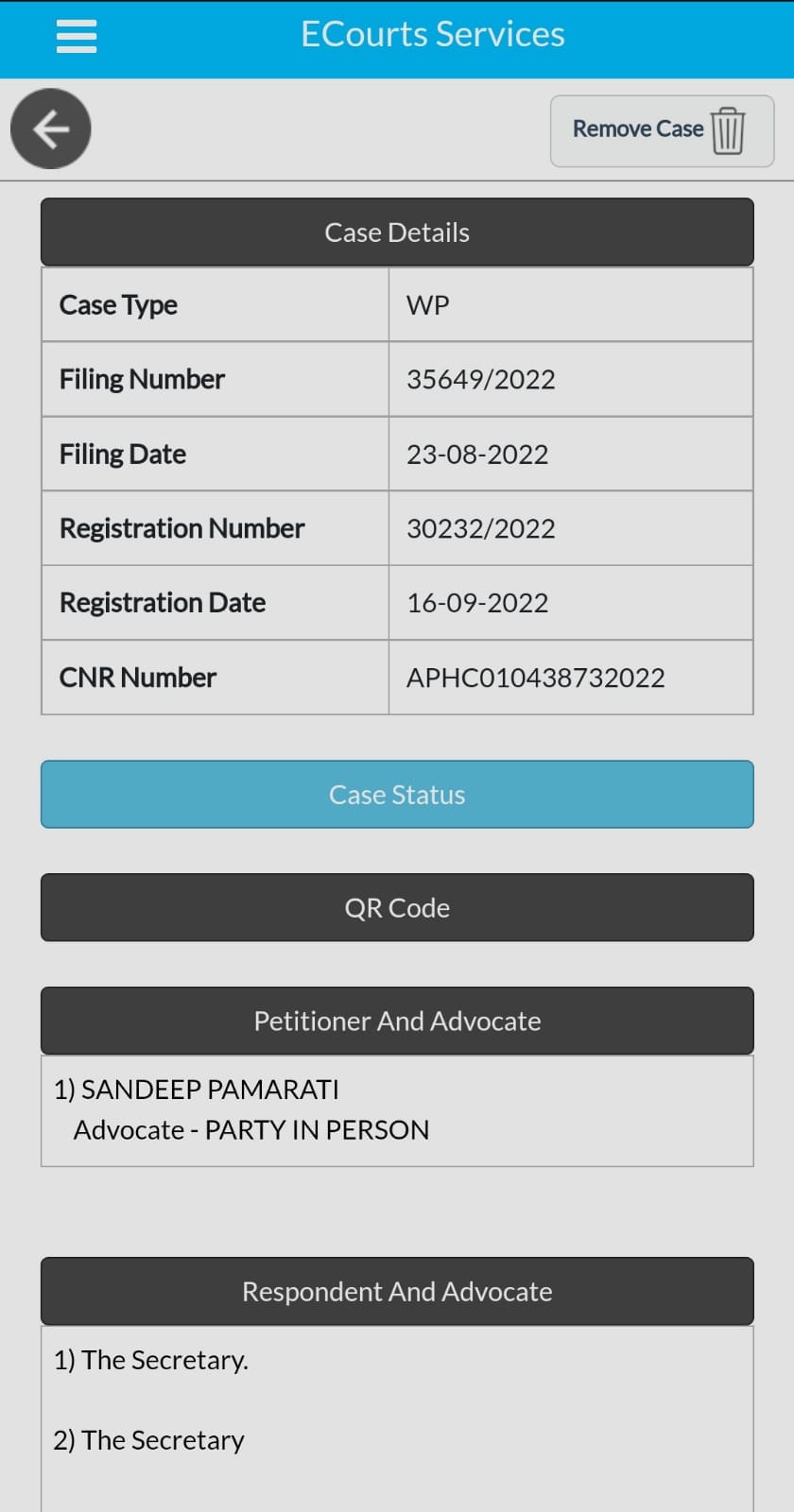

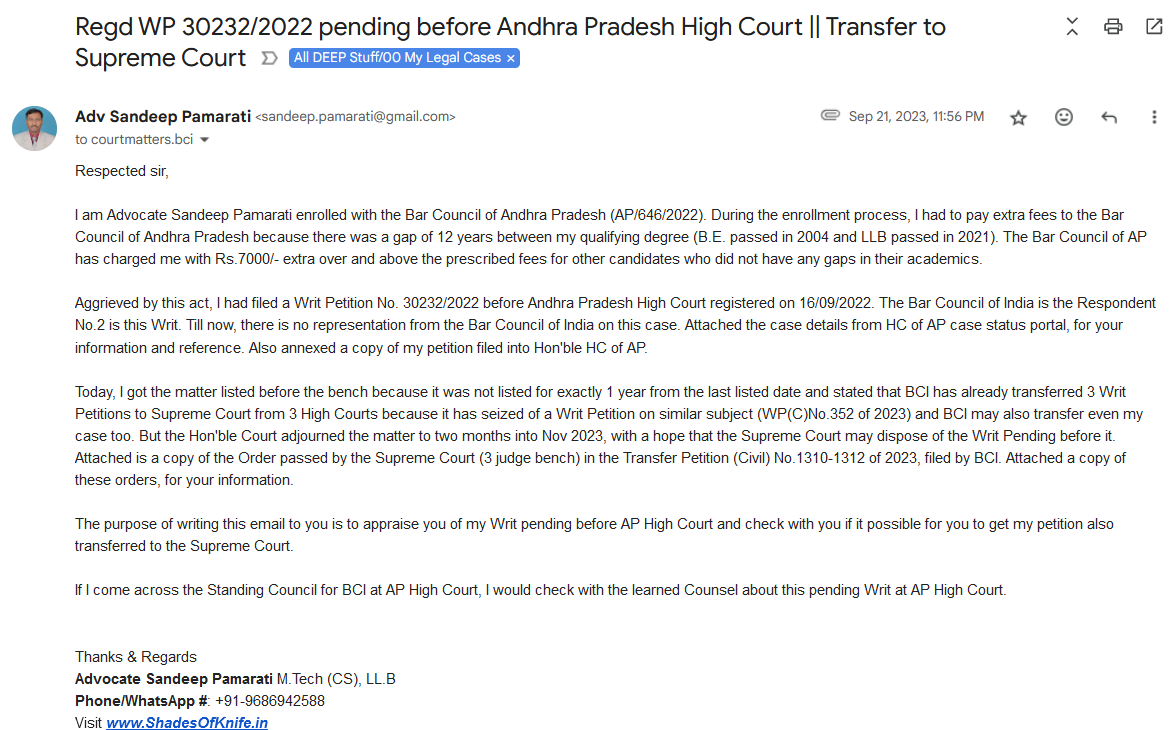
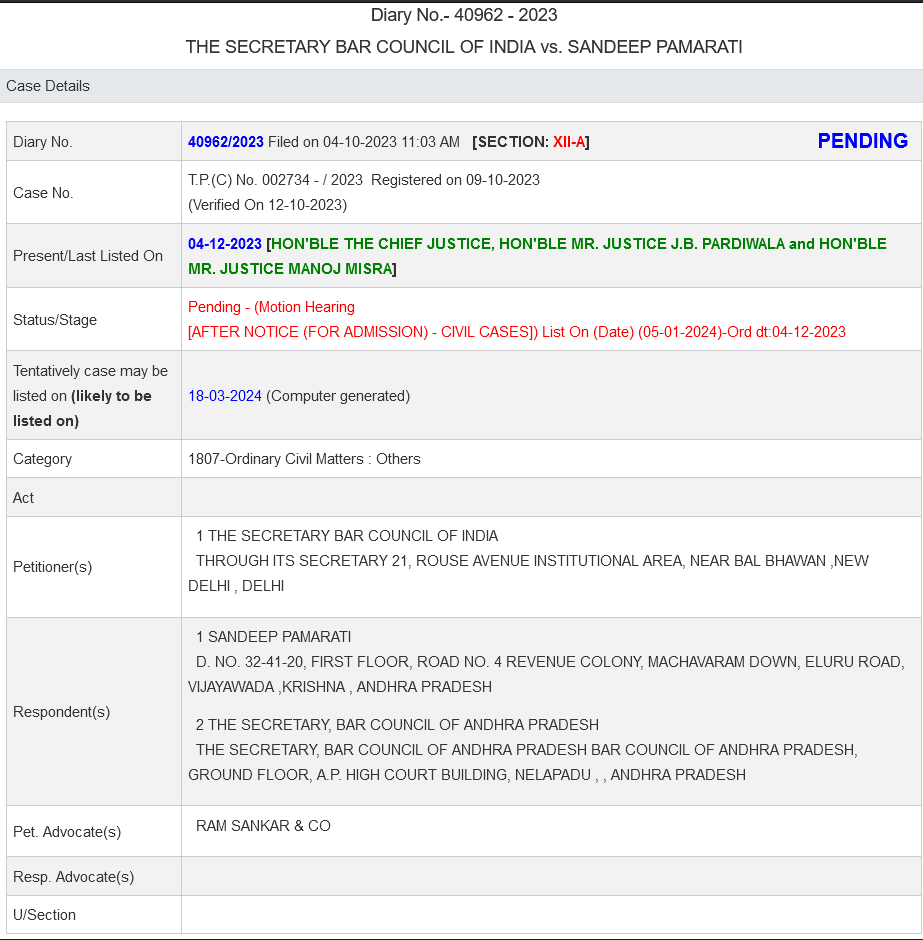
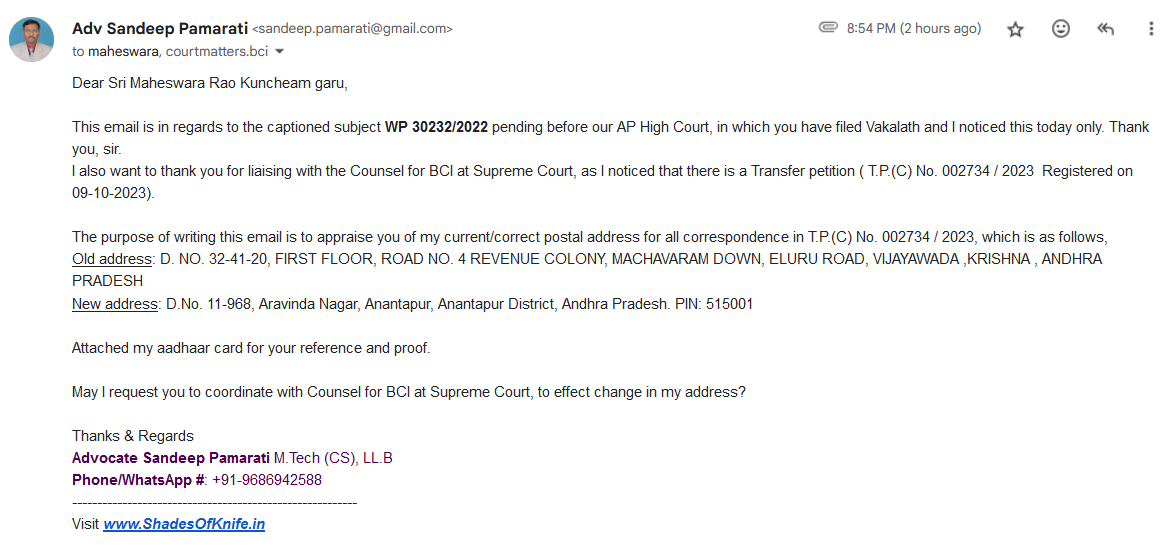




 ‘
‘

